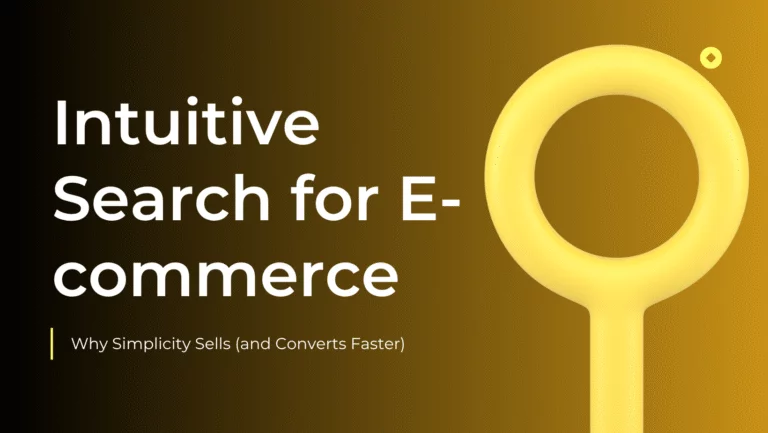The ecommerce journey often begins with a question typed—or spoken—into a search bar. But what if that experience feels clunky, slow, or just plain irrelevant?
That’s where intuitive search for ecommerce becomes a game-changer. When done right, it doesn’t just help users find products—it becomes the silent driver behind higher engagement, better retention, and more conversions.
In this blog, we’ll explore what makes a search intuitive, how it impacts the customer journey, and how to implement it to unlock more value from every visit.
What Is Intuitive Search for Ecommerce?
Intuitive search refers to a search system that anticipates the user’s needs, delivers instant, relevant results, and feels natural to use. It’s built around behavior, not just keywords.
It understands:

In short: intuitive search acts more like a helpful store associate than a static tool.
Why Intuitive Search Matters in Ecommerce
| Advantage | Impact |
|---|---|
| Better UX | Users find what they want—faster |
| Higher Conversions | Less friction = more purchases |
| Lower Bounce Rates | Users stay when results match intent |
| Increased AOV | Related, personalized suggestions = more items in cart |
| Data-Driven Optimization | Tracks queries, behavior, and intent for smarter merchandising |
Key Features of Intuitive Ecommerce Search
1. Autocomplete & Predictive Suggestions
Surfaces search terms before the user finishes typing, based on past behavior or popular trends.
2. Typo & Synonym Handling
Finds “headphones” even if users type “hedfones” or search for “earbuds.”
3. Contextual Filters
Auto-adjusts filters like size, price, brand, or material depending on query or category.
4. Zero Results Recovery
No dead ends—offers “Did you mean” alternatives or trending items.
5. Personalized Ranking
Renders results based on user behavior, location, and past purchases.
6. Visual & Voice Input
Let users upload images or speak queries for faster, more natural discovery.
Where Intuitive Search Drives the Most Value
- Homepage → Predictive suggestions and trending searches
- Product Pages → Smart “Search Again” options and similar items
- Category Pages → Filtering refinement powered by query behavior
- Mobile UX → Fast-loading, typo-tolerant search is critical on small screens
- Cart/Checkout → Find missing items before final conversion
How ExpertRec Powers Intuitive Search for Ecommerce
ExpertRec’s AI-driven engine transforms basic search into an intuitive experience by:
- Learning from every click, search, and purchase
- Autocomplete suggestions backed by behavior and trends
- Smart recovery when no exact match is found
- Real-time ranking that adapts based on performance
- Seamless mobile integration and voice/image search support
Best of all, it plugs into Shopify, WooCommerce, and other platforms without complex code.
Conclusion: Search That Thinks Like Your Shopper
When search works intuitively, it feels invisible. But the results are very real—better engagement, higher conversions, and happier customers.
Intuitive search for ecommerce is no longer a luxury. It’s a must-have in a market where every click, scroll, and search counts. Make it easier for shoppers to find what they want, and they’ll reward you with what you want: sales.
Frequently Asked Questions
1. What is intuitive search in ecommerce?
It’s a smart, responsive search system that understands user intent and delivers relevant results in real time.
2. Why is intuitive search important?
It improves user experience, reduces bounce rates, and increases conversion by making it easy to find products.
3. Can I implement intuitive search without coding?
Yes. Tools like ExpertRec offer plug-and-play intuitive search that integrates with platforms like Shopify and WooCommerce.
4. Does intuitive search help with SEO?
Indirectly—by reducing bounce rate and increasing dwell time, it signals higher engagement to search engines.
5. How is ExpertRec different from basic search?
ExpertRec uses AI to learn from behavior, personalize results, and recover from failed searches in real time.




